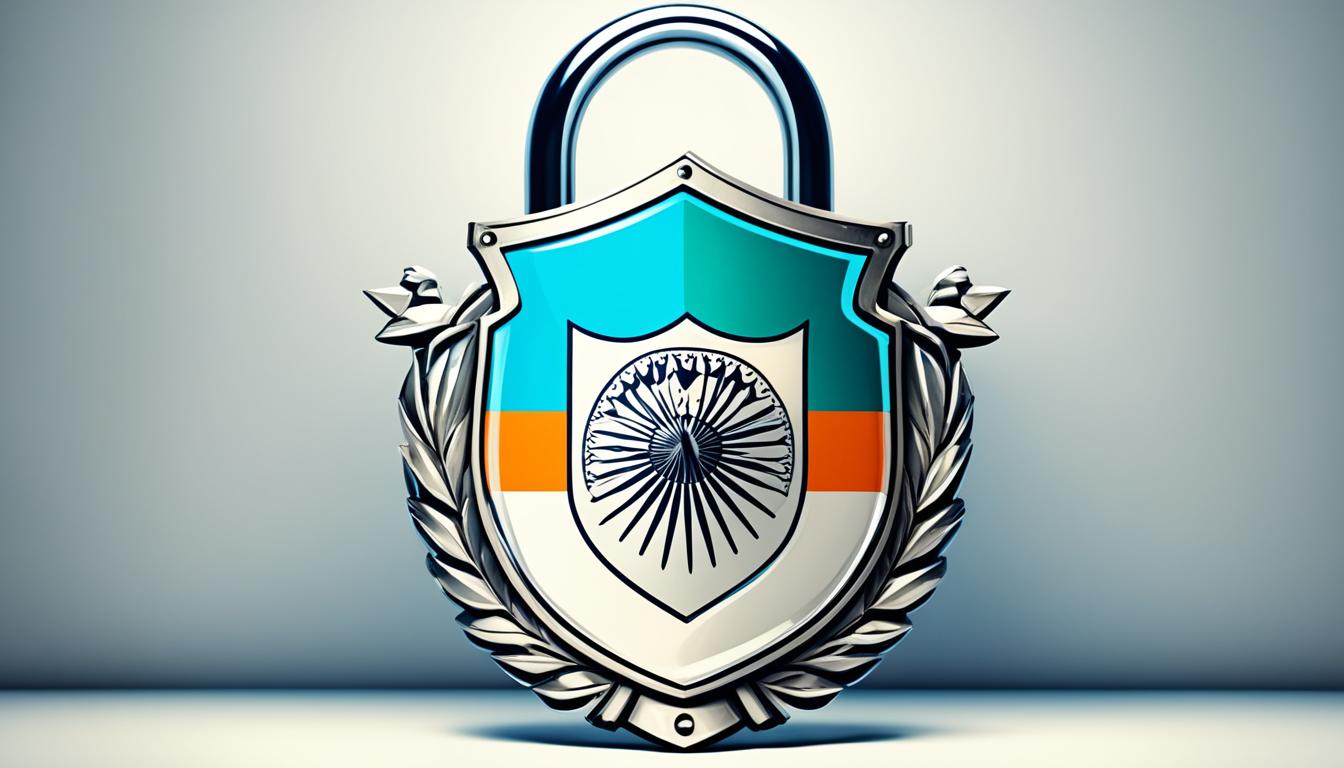Hyderabad , India
In today’s world, protecting our intellectual property is crucial. We work hard on new ideas, stories, and products that could change industries. But, we must also think about keeping these valuable assets safe.
When we’re in India, not protecting our ideas can have big problems. Our creative work needs strong protection to grow and stand out worldwide. This article will show how to keep your intellectual property safe in India. We’ll talk about securing trademarks, copyright, and more.
Key Takeaways
- Understanding different types of intellectual property is crucial for effective safeguarding.
- Timely filing for protection can significantly reduce the risks of theft.
- Engaging with IP experts enhances our ability to safeguard innovations.
- Documenting the development process of ideas can serve as vital legal evidence.
- Awareness of current legal frameworks and resources can empower entrepreneurs.
For more insights on how we can enhance our understanding of intellectual property and implement protective measures, visit this useful resource.
Understanding Intellectual Property in India
Exploring intellectual property shows us its many forms and importance. We find patents, trademarks, copyrights, geographical indications, and trade secrets among these types. Each one protects creators and boosts innovation and growth in our country.
Types of Intellectual Property
Each type of intellectual property has its own benefits and protections. Let’s look at them briefly:
| Intellectual Property Type | Protection Duration | Key Features |
|---|---|---|
| Patents | 20 years | Protects inventions and processes, granting exclusivity. |
| Trademarks | Indefinite (if distinctive) | Protects brand identity and stimulates fair competition. |
| Copyrights | Minimum 50 years after author’s death | Protects creative works like literature, music, and art. |
| Geographical Indications | Indefinite | Denotes goods linked to specific regions with unique characteristics. |
| Trade Secrets | Indefinite | Safeguards confidential business information. |
The Importance of Intellectual Property Rights
IP rights are crucial. They boost innovation and creativity, letting businesses protect their trademarks and creative works. These rights offer legal action against misuse, keeping businesses strong and attracting more investment.
In today’s global economy, managing intellectual property well is key. It protects our work and gives us an edge in fields like tech and pharma. By valuing IP rights, we can achieve success and build a better future for all.
Current Landscape of Intellectual Property in India
Looking at intellectual property in India today means focusing on key areas like the India National IPR Policy and government efforts to support it. This scene is all about valuing creativity and innovation. It helps our economy grow based on knowledge.
India’s National IPR Policy
The India National IPR Policy started in 2016. It’s a big step towards a strong system for intellectual property rights. The goal is to help the economy grow and improve people’s lives by protecting IP well.
It stresses the role of IPRs in pushing innovation. It also talks about the need for awareness and better ways to enforce IP rights. The policy calls for teamwork among different groups like big companies, small businesses, and startups.
A special IPR Think Tank helped create this policy. It makes sure the policy is useful and helps innovation to thrive.
Recent Government Initiatives and Developments
New steps by the government have made the IP scene even stronger. The Department of Industrial Policy and Promotion (DIPP) now leads in growing intellectual property in our country. They’ve set up a Cell for IPR Promotion and Management to help make and sell IP assets.
They’re also updating IP offices and using an IPR enforcement toolkit to fight against fake goods and piracy. Even with delays in patent applications, India is getting better at protecting copyrights with stronger enforcement.
| Initiative | Objective | Significance |
|---|---|---|
| National IPR Policy | Boost creativity and stimulate innovation | Enhances economic development, promotes public welfare |
| IP Cell under DIPP | Facilitate IP promotion and management | Supports stakeholders in an innovation-rich ecosystem |
| IP enforcement toolkit | Assist law enforcement against IP crimes | Reduces counterfeiting and piracy threats |
| Copyright legislation updates | Enhance enforcement of copyrights | Addresses issues like film piracy effectively |
Challenges in Protecting Intellectual Property
Protecting intellectual property in India faces many challenges. These issues can slow down innovation and creativity. Despite some progress in intellectual property rights (IPR), we still see big problems in enforcement, the legal process, and laws.
Enforcement Issues
IP enforcement is a big challenge. Many agencies tasked with protecting IP don’t have enough resources. This makes them less effective. Not many people know how important intellectual property rights are.
This lack of knowledge leads to more piracy and counterfeiting. These issues hurt the efforts to protect original works. They are especially big problems in music and film, where piracy can cause a lot of financial loss.
Judicial and Legislative Challenges
Legal challenges make it hard to protect IP. Long legal processes create uncertainty for those seeking justice. Our laws are also outdated and don’t match the speed of technology changes.
We need new laws that help innovation grow. Updating laws is key to dealing with the changing nature of intellectual property in India.

Effective Ways to Protect Intellectual Property
In today’s digital world, protecting our intellectual property is crucial. We need to use many methods to keep our innovations safe. This ensures our creative works stay unique in a crowded market.
Applying for Trademarks, Patents, and Copyrights
Applying for trademarks, patents, and copyrights is key to protecting our work. These legal tools stop others from using our ideas without permission. Trademarks help us stand out with unique names, logos, or symbols. Copyrights protect our art, like texts and images. Patents cover new technologies and inventions that are not known to the public.
Continuous Innovation and Documentation
Being innovative keeps us ahead in the game. It helps us keep our intellectual property safe. Keeping detailed records of our work is important for proving we own it. This can be vital in legal disputes.
We also need to keep our tech teams apart to limit who knows our full product details. This makes our intellectual property even safer.
| IP Type | Protection Duration | Key Benefits |
|---|---|---|
| Trademarks | Indefinite (as long as in use) | Brand differentiation and prevention of imitation |
| Patents | 15 to 20 years | Exclusive rights to inventions and technologies |
| Copyrights | 70 years after creator’s death | Protection of original artistic works |
To keep our ideas safe, we must keep them secret until they’re protected. Registering our work early stops theft and gives us an edge over others. Staying alert and proactive helps us prevent others from breaking the rules.
Protect Intellectual Property Through Team Awareness
Creating a strong team awareness IP protection culture is key to keeping intellectual property safe. By giving our employees employee training, we teach them to spot and respect different kinds of intellectual property. This helps avoid mistakes and builds a place where everyone knows how important it is to guard our assets.
Employee Training and Education
With intellectual property education, teams learn about the laws and best ways to protect IP. We offer special training to make sure they know about the IP types we deal with and how to keep things private and honest. Our goal is to:
- Make training that fits our business and covers IP laws.
- Use tools like WIPO’s IP Outreach Guide to spread the word.
- Keep them updated on new trends and challenges in IP, like NFTs and AI.
As technology and markets change, our trained team is key in showing how important IP rights are. This education fights wrong ideas about IP laws, showing not everything can be shared online. This helps us fight off legal issues and makes our team ready to protect our intellectual property.
| Training Focus | Expected Outcome |
|---|---|
| Understanding IP laws | Increased compliance and risk mitigation |
| Recognizing various IP types | Improved asset protection strategies |
| Implementation of IP management tools | Enhanced IP oversight and collaboration |
| Awareness of IP trends | Informed decision-making and strategic planning |
By focusing on a solid training plan, we not only keep our intellectual property safe. We also build a team ready to handle the complex issues of IP protection.
The Role of Non-Disclosure Agreements (NDAs)
Non-Disclosure Agreements, or NDAs, are key to protecting intellectual property. They are crucial when sharing sensitive information. By understanding NDAs, businesses can keep their data safe when working with others. Strong NDAs make sure everyone knows what they must keep secret.
Importance of Drafting Strong NDAs
Creating strong NDAs means adding certain parts that make the agreement clear. These parts include:
| Element | Description |
|---|---|
| Identification of Parties | Name the individuals or entities involved in the agreement. |
| Definitions | Clarify the terms and scope of confidential information. |
| Obligations | Specify the responsibilities of each party regarding confidentiality. |
| Scope | Define the limitations on the use of the confidential information. |
| Time Frame | Outline the duration of the NDA and protection period. |
| Return of Information | Detail how confidential information should be managed upon agreement termination. |
| Exclusions | List information not considered confidential. |
| Remedies | Identify potential consequences for breaching the NDA. |
Good NDAs greatly lower the risk of sharing secrets without permission. In fact, 92% of businesses with NDAs see fewer issues with intellectual property. Also, 85% think NDAs are key to protecting their ideas. This is especially true in tech and biotech, where most companies use NDAs.
Understanding the role of NDAs helps us protect our ideas from theft. When we work with new partners, clients, or staff, using strong NDAs is a must. This keeps our secrets safe.

Engaging with Intellectual Property Experts
To protect our intellectual property, it’s key to work with experts. They guide us through the complex world of IP law. Consulting an IP attorney at key stages, like when applying for patents or trademarks, helps avoid legal issues.
When to Consult an IP Attorney
Knowing when to get expert advice is crucial for our IP success. Here are times when seeking help is especially useful:
- When preparing to file for a patent, trademark, or copyright to ensure compliance with existing laws.
- In cases of suspected IP infringement, to assess the situation and decide on appropriate actions.
- When expanding into international markets, as different jurisdictions have different IP laws.
- During the creation or update of non-disclosure agreements (NDAs) to protect sensitive information.
Value of IP Audits
Regular IP audits are a proactive way to manage our intellectual property. They help us:
- Evaluate the current status of our IP assets.
- Identify gaps in protection and strategize future developments.
- Ensure compliance with legal requirements in a continually changing landscape.
- Enhance our overall IP management strategy, thus minimizing the risk of loss or infringement.
Working with experts and conducting thorough evaluations helps protect our intellectual property rights. By getting expert advice and doing IP audits, we can strengthen our assets against risks and challenges.
| Intellectual Property Type | Protection Duration | Key Features |
|---|---|---|
| Copyrights | Lifetime of the creator + 70 years | Protects written and artistic works. |
| Trademarks | Indefinite (if renewed every 10 years) | Protects words, phrases, symbols, logos. |
| Utility Patents | 20 years | Protects inventions of different kinds. |
| Trade Secrets | Indefinite (as long as kept secret) | Safeguards valuable business information. |
The Impact of Technology on IP Protection
Today’s fast-paced business world shows the big role technology plays in IP protection. Digital tools have made managing intellectual property easier. They help us protect patents, trademarks, and copyrights in new ways.
Use of Digital Tools for IP Management
More patents are being applied for as innovation speeds up. Digital tools help track deadlines, watch for infringements, and keep documents in order. They give us easy access to databases, helping us make smart choices about our IP.
With more digital piracy, we’ve seen a rise in Digital Rights Management (DRM) technology. This tech is key in fighting against unauthorized copying. More trademarks are being registered online, showing how important strong IP strategies are in the digital world.
Keeping trade secrets safe is harder now, as they can be stolen or leaked easily. Digital signatures and technology help prove documents are real and keep secrets safe. Cryptography is also key in keeping data safe during sharing, making sure our secrets stay secret.
Companies are getting bigger and looking to buy new tech and IP. The value of secrets is growing, leading to more legal fights over them. We need to keep up with these changes, using digital tools to protect our IP.
| Challenge | Technology Solution |
|---|---|
| Increase in patent applications | Online patent management software |
| Digital piracy | Digital Rights Management (DRM) |
| Trademark enforcement | Automated monitoring tools |
| Theft of trade secrets | Digital signatures and encryption |
| Litigation over IP | IP management analytics |
Conclusion
Protecting intellectual property in India is key to staying ahead in today’s fast-paced market. We’ve looked at the main types of IP and the laws that cover them. Using strategies like trademarks, patents, and copyrights helps keep our creative work safe.
Keeping up with innovation and teaching employees about IP rights is also crucial. Tools like Non-Disclosure Agreements add extra security. Working with intellectual property experts helps us stay ahead of legal issues. This proactive approach is vital for long-term success.
Understanding and adapting to IP laws is essential for doing well in our fields. At Am Accountable, we offer virtual accounting services for startups in India. We focus on protecting your innovations and ideas with strong IP strategies. Contact us at +91 91778 42756 to keep your intellectual property safe.
FAQ
What is intellectual property (IP), and why is it important?
Intellectual property (IP) includes things like inventions, designs, and writings. It’s key for businesses to protect it. This helps with innovation, growth, and legal action against misuse.
What are the different types of intellectual property in India?
In India, IP covers patents, trademarks, copyrights, and more. Each type protects creators and innovators. It helps them keep their unique work safe.
How does the National IPR Policy support IP protection in India?
India’s National IPR Policy, launched in 2016, aims to boost creativity and innovation. It does this by making processes easier and raising awareness about IP rights.
What challenges exist in protecting intellectual property in India?
Challenges include weak IP agencies, complex legal processes, and outdated laws. These issues make it hard to keep up with new tech.
How can businesses effectively apply for trademarks, patents, and copyrights?
Businesses should research well to make sure their ideas are new. They need to prepare detailed applications and follow all legal steps to protect their IP.
Why is it important to raise team awareness about intellectual property?
Teaching employees about IP helps prevent mistakes and builds a culture of respect. This is key to keeping IP safe.
What role do Non-Disclosure Agreements (NDAs) play in protecting intellectual property?
NDAs are key for keeping secrets when sharing info with others. A good NDA sets clear rules for everyone, preventing issues and protecting secrets.
When should businesses consult an intellectual property attorney?
Businesses should talk to an IP lawyer when applying for patents, trademarks, or copyrights. They should also seek advice on infringement issues. An IP lawyer can help with the complex laws.
How can technology enhance intellectual property protection?
Technology helps with IP by making it easier to watch for infringement, keep track of deadlines, and organize documents. It makes protecting IP assets much better.








